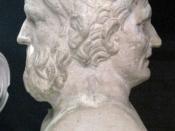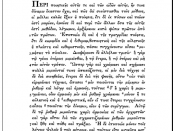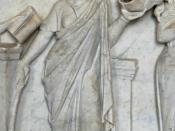Abstract: By analyzing the idea of comedy that Aristophanes described in his comedy Acharnians, and comparing it with that of Aristotle and Horace, I am trying to develop a revolution of the theory of comedy as the basic genre in western literature.
Key Words: Theory of comedy, Aristophanes, Aristotle, catharsis Greek Comedy developed through three phases: 1) Old Comedy, popular at Athens during the fifth century BC, characterized by the prominent role of the chorus, the use of obscenity in both language and gesture, an emphasis on political and social satire, and a vigorous concern with current events; 2) Middle Comedy, a term used to refer to comedies written between 400 and 320 BC, characterized primarily by the decline in importance of the chorus; 3) New Comedy (320 to about mid-third century BC), a non-political form of comedy that ignores current events and has young love as a primary theme, with a chorus that does not participate in the plot.
Middle and New Comedy were much less obscene.
Greek New Comedy is represented only by one virtually complete play of Menander and some large portions of six other plays. Of Old Comedy, we have only ten plays of Aristophanes, and his Plutus as the only surviving example of Middle Comedy. History contains few notices of Aristophanes' life, though he has been praised now as the greatest comedian of his age, and perhaps of all the ages. Even the dates of his birth and death can only be inferred from his works, the former being estimated at 456 B.C. and the latter at 380. He was said to be only an adopted citizen of Athens, was doubtless educated at Athens.
Traditionally, comedy has to do with the concerns and exploits of ordinary people. The characters of comedy therefore tend to be plain, everyday figures (e.g., lower or middle-income husbands and wives, students and teachers, children and parents, butchers, bakers, and candlestick-makers) instead of the kings, queens, heroes, plutocrats, and heads of state who form the dramatis personae of tragedy. Comic plots, accordingly, tend to be about the kind of problems that ordinary people are typically involved with: winning a new boyfriend (or reclaiming an old one), succeeding at a job, passing an exam, getting the money needed to pay for a medical operation, or simply coping with a bad day. Again, the true hallmark of comedy isn't always laughter. More often, it's the simple satisfaction we feel when we witness deserving people succeed.
Unlike classical Eastern theoretical works on drama Aristotle's work makes only minor passing observations on the physical realization of the dramatic text, thus establishing an orientation essentially unchanged until the past century. Aristotle considers both the nature of tragedy (an idealized imitation of human action) and its function (the catharsis of such emotions as pity and fear). This argument for the psycho-social benefit of catharsis may have been at least partly in response to Plato's distrust of art as a stimulus to the passions and as an inferior imitation of the world of appearance. The other most influential classical theorist was Horace, whose Art of Poetry contains specific formal directions and the often quoted double aim of poetry, to delight and to instruct.
Compared with the theory of tragedy, the tradition of comedy has long been regarded as a lower form of drama. According to Aristotle (who speculates on the matter in his Poetics), the function of drama is katharsis, usually interpreted as purifying. But it is actually a word of whose meaning scholars will never reach an agreement. Aristotle obviously believed that tragedy could reach that goal much easier. And he even did not discuss comedy with more details in his Poetics.
The medical catharsis (catharsis as purgation) of Politics is also expected in the tragic performances, as both Poetics and Politics speak of the catharsis of pity and fear and Politics has left the fuller explanation of the catharsis in general to Poetics. Tragic catharsis, however, cannot be reduced to the purgation of the emotions. As Aristotle put the catharsis clause at the end of the definition of tragedy, catharsis must be the final cause of making tragedies and represent the proper effect of the tragedy. The fact that the fuller discussion is left to Poetics also suggests that the catharsis in Poetics is not restricted to the application of the musical catharsis of Politics. In the explanation of tragedy, the word catharsis has been generally translated as "purification", a process through which the audience may get rid of the bad from their mind.
This interpretation has been widely accepted in Europe as well as in China until very recent time. The one reason is that Aristotle's idea of comedy can be seen as the reasonable derivation from Aristophanes' expression in his comedy Acharnians. Dicaeopolis, an Athenian citizen, who was sick and tired of the ill-success and miseries of the war, made up his mind to induce the people to adopt his policy of "peace at any price", and said in the play, "I dare in a Comedy to speak before the people of Athens of the public weal; Comedy too can sometimes discern what is right." In the following chorus, Aristophanes' explanation of comedy comes: CHORUS: As for you, never lose him [Dicaeopolis], who will always fight for the cause of justice in his Comedies; he promises you that his precepts will lead you to happiness, though he uses neither flattery, nor bribery, nor intrigue, nor deceit; instead of loading you with praise, he will point you to the better way.
(Aristophanes, Acharnians) It seems that Aristophanes' putting the purpose of comedy as to "Fight for the cause of justice" is a defense of his comedy, as people had been thought that comedies can only entertain by joking language, dressing as a fool, etc., without any serious thoughts or truth in it. Aristophanes tried to persuade the people he could also "speak before the people of Athens of the public weal". But I would like to say Aristophanes' defense of comedy is actually not the only truth of comedy, but an evaluation of comedy using the standard of tragedy. Tragedy has long been accepted as a form of grand story with heroes, and serious instructive purpose. Tragedy has established it status before comedy developed into a complete form. But comedy is indeed a different thing. If Comedy is to "fight for the cause of justice" just as tragedy does, comedy is only an appendix. Comedy is to lead people to happiness, and point out the better way of life. These last words of the quoted part are actually more relevant to the truth of comedy.
Aristotle didn't give a full survey of comedy, partly because he could not use the same system of catharsis to explain comedy. But his followers never failed in trying to restore his concept of tragedy into comedy. In Tractanus Coislinianus (The Outline of Theory on Comedy as the Chinese Translation by Luo Nian-sheng) which is at least influenced by Aristotle's Poetics ensure us a reconsideration of comedy in the conventional binary system of drama. Comedy was explained in a way just parallel to Aristotle's words on tragedy in Poetics. Though the author tried his best in imitating Aristotle, he still can not ignore one thing of comedy. That is, using his own word, laughter. Without laughter there would be no comedy.
By examining Aristophanes' "happiness", Aristotle's "catharsis" and "laughter" in Tractanus Coislinianus, we may see the evaluation of the concept of comedy. Aristophanes talked on comedy from his theatre experience. He could learn everything from Euripides, that is, from tragedy, but in a very different way. He did speak of war and peace, of the public weal, but he had to do it in his comic way. Jokes, puns, fools, beggars are not only additional parts of his comedy, they are always the most important. Dicaepolis in Acharnians spoke in two different tones. When he was borrowing filthy dress and other things from Euripides, he was a joker.
DICAEOPOLIS: Euripides....
EURIPIDES: What words strike my ear? DICAEOPOLIS: You perch aloft to compose tragedies, when you might just as well do them on the ground. I am not astonished at your introducing cripples on the stage. And why dress in these miserable tragic rags? I do not wonder that your heroes are beggars. But, Euripides, on my knees I beseech you, give me the tatters of some old piece; for I have to treat the Chorus to a long speech, and if I do it ill it is all over with me.
EURIPIDES: What rags do you prefer? Those in which I rigged out Aeneus on the stage, that unhappy, miserable old man? DICAEOPOLIS: No, I want those of some hero still more unfortunate.
EURIPIDES: Of Phoenix, the blind man? DICAEOPOLIS: No, not of Phoenix, you have another hero more unfortunate than him.
EURIPIDES: Now, what tatters DOES he want? Do you mean those of the beggar Philoctetes? DICAEOPOLIS: No, of another far more the mendicant.
EURIPIDES: Is it the filthy dress of the lame fellow, Bellerophon? DICAEOPOLIS: No, 'tis not Bellerophon; he, whom I mean, was not only lame and a beggar, but boastful and a fine speaker.
EURIPIDES: Ah! I know, it is Telephus, the Mysian.
DICAEOPOLIS: Yes, Telephus. Give me his rags, I beg of you.
(Aristophanes, Acharnians) As a Chinese reader of this part and the following of the play, I would say it is familiar to the Chinese traditional comic form Xiangsheng, the comic dialogue presented by two comedians. But Chinese comic dialogues are signified with a special plot named Baofu (meaning package in Chinese) by which a unpredictable comic surprise is revealed. Aristophanes' comedy is not only of comic language, but also performance, which is actually one main joyfulness of comedy's appreciation, but the tradition theory from Aristotle never paid much attention to. In fact the Greek word komoidia means "the song of the komos." A komos is a communal ritual carouse: on a small scale it is the ancient equivalent of party-crashing and bar-hopping rolled into one, but as part of a communal festival of Dionysus it recalls modern carnivals such as that of Mardi gras (although the ancient rites were usually more carefully scripted and ordered) - a time when normal social rules and inhibitions are cast aside and people party in the streets, singing, dancing, and (often) drinking. [ ] The following part of the play tells that Dicaeopolis wanted to borrow the little Mysian hat, a beggar's staff, a little basket with a lamp alight inside, a little broken cup, a small pipkin stoppered with a sponge, a few small herbs for the basket, and even some of the chervil Euripides' mother left in her will! It is a great fun even reading those lines of the play, but we can imagine the actor who acting Dicaeopolis wearing that Mysian hat, holding all those things. It must be a great scene on the stage, terribly causing laughter of the audience.
DICAEOPOLIS: Oh, my soul! You see how you are driven from this house, when I still need so many accessories. But let us be pressing, obstinate, importunate. Euripides, give me a little basket with a lamp alight inside.
EURIPIDES: Whatever do you want such a thing as that for? DICAEOPOLIS: I do not need it, but I want it all the same.
⦠DICAEOPOLIS: Ah! you do not know all the pain you cause me. Dear, good Euripides, nothing beyond a small pipkin stoppered with a sponge.
EURIPIDES: Miserable man! You are robbing me of an entire tragedy. Here, take it and be off.
(Aristophanes, Acharnians) In those parts Dicaeopolis was not indeed to be offensive to Euripides, while Euripides was also joking with him, and the audience understand this quite well. Nobody would take it seriously as a criticize of Euripides, as they know it just for fun. But those parts contribute the most significant character of the play, Acharnians would be no longer a real comedy without those apparently "useless" parts.
Aristotle tried using the idea of catharsis in explaining why people like watching tragedy. But as I mentioned previously, the word "catharsis" has always been a confusing idea. Nobody can give the definite meaning of the word. "Purification" is the widely-accepted relevant. By watching the heroes suffering from great pain, the audience could recognize their own suffering, and realize the dreadful results of their moral errors. From this point, Horace developed his often quoted double aim of poetry, to delight and to instruct, or "profit and pleasure to mix with art" as he wrote in his Art of Poetry: Poets would profit or delight mankind, And with the pleasing have th' instruction joined Short be the precept, which with ease is gained By docile minds, and forcefully retained.
If in dull length your moral is expressed, The tedious wisdom overflows the breast.
Would you divert? The probable maintain, Nor force us to belief the monstrous scene, That shows a child, by a fell witch devoured, Dragged from her entrails, and to life restored.
Grave age approves the solid and the wise; Gay youth from too austere a drama flies; Profit and pleasure, then, to mix with art, To inform the judgment, nor offend the heart, Shall gain all votes.
(Horace, The Art of Poetry) It seems that Horace's consideration is quite true to comedy, as it combined comic factors with the serious topic of war and peace. The problem is "pleasure" is still a confusing word. The pleasure of watching a tragedy is obviously different from that of a comedy. If we take the pleasure in a moral vision, that is, the pleasure after purification from the bad intentions; then it would be not fit in comedy. People gain pleasure from comedies directly from the language and performance. But Horace has long been respected as the representative in Aristotle's tradition, his concept of pleasure is actually quite questionable. It is more likely that Horace take pleasure as the result of catharsis in stead of the pleasure from comic language and performance, especially of the so-called old comedy representing by Aristophanes, which was known for its obscenity.
To conclude, I would say the theory of comedy in classical world is actually not well developed and established. Aristotle mentioned he would have an explication on comedy in his Poetics, but it never appeared. Aristotle did recognize the real cause of the pleasure of watching comedy, much of which comes from the performance as well as the language. He was not a formalist. The form, that is the language, the plot and performance, is only subordinate to the topic, or the moral insight. Horace's double aim seemed to have the two aspects in the same light, but it is nothing different from Aristotle's theory. It is a mono-system centered on contents only. It is not able to cover all literature forms, especially comedy. Being situated on a border line between literature and physical performance, comedy from its beginning was not developed under the guide traditional literary theory. Aristophanes' work revealed this quite well. The fact that comedy developed in a vacuum of theoretic guide can explain why the idea of comedy vary so much in modern times. Every nation has its own comedy, and even in the same culture, people disagree with each other on what should be a good comedy.
Bibliography [1] http://www.theatrehistory.com/ancient/comedy001.html Aristophanes, Acharnians. English translation e-text: http://classics.mit.edu/Aristophanes/acharnians.html Aristotle, Poetics. English translation e-text: http://classics.mit.edu/Aristotle/poetics.html Horace, The Art of Poetry. English translation e-text: http://classicpersuasion.org/pw/horace/horacepo.htm Marvin Carlson, Drama Theory, The Johns Hopkins University Press, 1997 Robert Storey, Comedy, its theorists, and the evolutionary perspective, 1996.
E-text: http://www.findarticles.com/p/articles/mi_m2220/is_n3_v38/ai_18796173 Masahiro Kitano, Aristotle's Theory of Comedy, Pubished in Bulletin of Gunma Prefectural Women's University, 22, 2001 John Porter, Aristophanes and Greek Old Comedy, http://duke.usask.ca/~porterj/CourseNotes/Aristophanes.html





